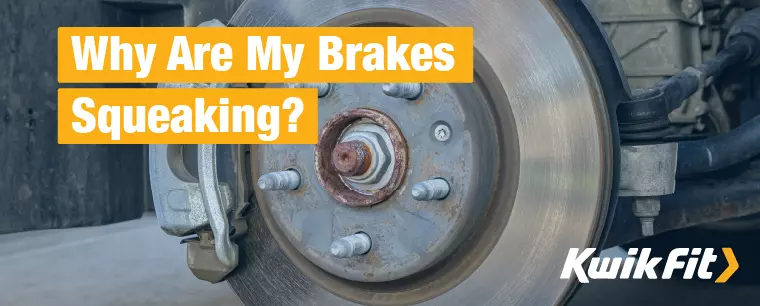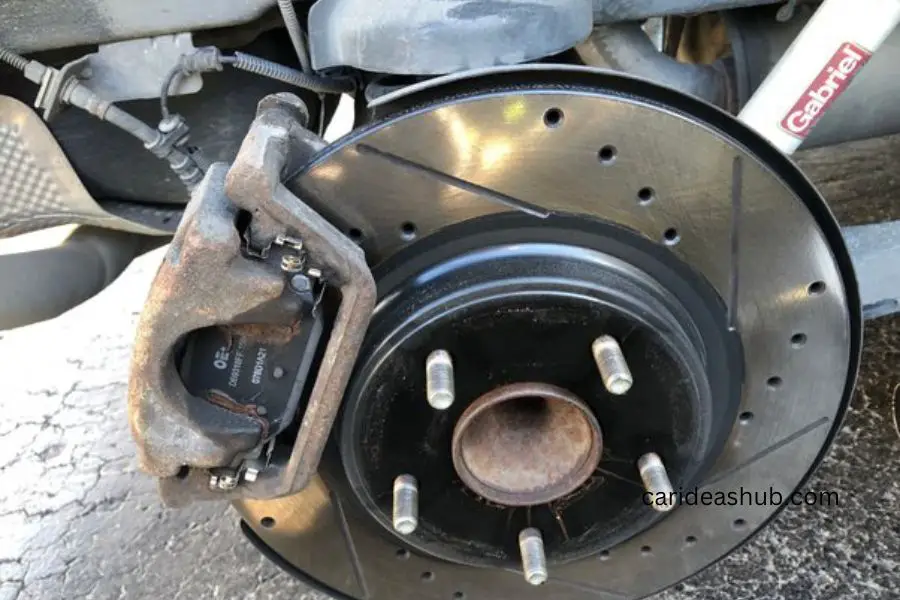New brakes may squeak when stopping slow because they need to be broken in. This is because brake pads are designed to wear down as they are used, new-brakes-squeak-when-stopping-slow, and the initial contact with the spinning rotors can cause vibrations and squeaking sounds.
To stop the squeaking, you can try lubricating the brake pads to reduce friction. Additionally, avoiding harsh stops during the break-in period can help the brake pads wear in correctly.

Credit: www.carfax.com
Understanding Brakes Squeaking
New brakes may squeak when stopping slow due to their initial break-in period. The combination of the brake pads’ ceramic and metallic materials, along with the vibration against the spinning rotors, can produce the squeaking sound. This is normal and will subside once the brakes are properly worn in.
Reasons For New Brakes Squeaking
When it comes to new brakes squeaking, there can be several reasons why this annoying sound occurs. Understanding these reasons can help you address the issue and enjoy a quieter and smoother braking experience.
Break-in Period For New Brakes
One of the main causes of new brakes squeaking is the break-in period. Brake pads are designed to wear down as you use them, and they undergo a process of bedding in or breaking in. During this period, the brake pads and the spinning rotors may vibrate, leading to a squeaking sound.
new-brakes-squeak-when-stopping-slow
It’s important to note that the break-in period can vary depending on the type of brake pads you have installed. Some manufacturers recommend a break-in period of around 200-500 miles, while others may have different specifications.
During this break-in period, it’s normal to experience some squeaking when stopping at slow speeds. However, if the squeaking persists beyond the break-in period or becomes louder or more frequent, it’s worth investigating further.
How To Address Brake Squeaking
If your new brakes continue to squeak even after the break-in period, there are a few steps you can take to address the issue.
1. Lubricate the touchpoints: One common solution is to lubricate the touchpoints of the brake pads. This involves removing the brake pads from the calipers and applying brake lubricant to the back of the pads, avoiding the friction material. This can help reduce friction and eliminate the squeaking sound.
2. Check for any issues: It’s important to inspect the brake system for any potential issues that may be causing the squeaking. This could include checking for worn brake hardware, ensuring proper lubrication of other components, and examining the overall condition of the brake system.
3. Seek professional help if needed: If you’ve tried the above steps and the squeaking persists, it may be best to consult a professional mechanic. They can conduct a thorough assessment and identify any underlying problems that may require repair or replacement.
In conclusion, understanding the reasons behind new brakes squeaking can help you address the issue effectively. Remember to allow for a break-in period and consider taking steps like lubricating the touchpoints or seeking professional assistance if the squeaking persists. By addressing the issue early on, you can ensure a quieter and safer braking experience.

Credit: www.kwik-fit.com
Dealing With Brake Squeaking
If your new brakes squeak when stopping slow, don’t panic. This is a common issue caused by the brake pads needing to be broken in. As you use them, the ceramic and metallic materials in the pads can cause vibrations that result in squeaking.
Give it time and the noise should go away.
Lubrication As A Solution
If your new brakes are squeaking when stopping slow, one simple solution is to lubricate the brake pads. This can help reduce the friction between the pads and the calipers, preventing the squeaking sound. Lubricating the touchpoints of the brake pads involves taking the brake pads out from the calipers and then applying brake lubricant to the back of the brake pad, avoiding the friction material. By doing this, you can effectively eliminate the squeaking noise and enjoy a quieter braking experience.
Addressing Specific Scenarios
Experiencing squeaky new brakes when stopping slowly? It could be due to the brake pads and rotors needing to be broken in. This is a common occurrence with new brake pads, as the initial use can cause vibration and produce a squeaking sound.
Allow the new brakes to wear in naturally and refrain from abrupt stops for optimal performance.
Squeaking At Low Speed
If your new brakes are producing a squeaking sound when stopping slow, it may be due to the break-in process. New brake pads are designed to wear down gradually, consisting of ceramic and metallic materials. When first pressed against the spinning wheel rotors, vibrations can occur, leading to the squeaking sound. It’s essential to allow for a break-in period, during which the pads and rotors adjust to each other, reducing the squeaking over time.
Grinding Noises When Slowing Down
Grinding noises when slowing down may indicate worn brake pads. As the pads lose thickness over time, they can produce squealing sounds referred to as “brake scrubbing.” With further wear, the sound may transition to a grinding noise. In this scenario, it’s crucial to have the brake pads inspected and replaced if necessary. Ignoring this issue can lead to potential damage to the rotors and compromise the braking performance of your vehicle.

Credit: www.youtube.com
Avoiding Common Mistakes
Discover why your new brakes squeak when stopping slow. This common issue occurs because brake pads need to be broken in. As you use them, the pads wear down, causing vibration against the rotors and producing a squeaky sound. Keep driving and avoid harsh stops to help the brake pads break in correctly.
Impacts Of Aggressive Stopping
Aggressive stopping can have detrimental effects on your new brakes, leading to squeaking sounds and other issues. When you brake suddenly and forcefully, it puts excessive pressure on the brake pads and rotors, causing them to wear unevenly. This can result in a loss of braking efficiency and increase the likelihood of brake squeaking. Additionally, aggressive stopping generates more heat, which can lead to brake fade and reduce the overall lifespan of your brakes.
Proper Break-in Techniques
Properly breaking in your new brakes is crucial for minimizing squeaking and ensuring optimal performance. Here are some essential break-in techniques:
- Gradual Breaking: Start by driving at a moderate speed and applying the brakes gently. Gradually increase the intensity of your brake applications over the first few hundred miles to allow the brake pads to properly bed-in with the rotors.
- Avoid Excessive Braking: During the break-in period, try to avoid constant and aggressive braking. If possible, maintain a safe distance from the vehicle ahead to minimize the need for sudden stops.
- Avoid Overheating: Excessive heat can cause the brake pads to glaze over, leading to squeaking. To prevent this, avoid prolonged or repeated heavy braking during the initial break-in period.
- Follow Manufacturer Recommendations: Always refer to your vehicle’s owner’s manual for specific break-in instructions provided by the manufacturer. Following these guidelines will help you protect your new brakes and prevent issues such as squeaking.
By following these proper break-in techniques, you can significantly reduce the chances of experiencing squeaking brakes after getting a brake replacement. It’s essential to remember that each vehicle and brake system may have different break-in requirements, so consult your manual for accurate instructions specific to your vehicle.
Expert Advice And Solutions
Professional Recommendations
If you’ve recently replaced your brakes and noticed that they squeak when stopping slow, don’t worry – you’re not alone. This is a common issue that many drivers encounter after installing new brake pads. The good news is that there are expert recommendations and solutions to help alleviate this problem and get you back on the road with quiet, smooth braking.
One professional recommendation is to allow your new brakes to break in properly. When brake pads are brand new, they need time to wear down and conform to the shape of your rotors. This process can take anywhere from a few hundred miles to a thousand miles, depending on your driving habits.
In addition to break-in time, it’s important to ensure that you’ve chosen high-quality brake pads that are compatible with your vehicle. Cheap or low-quality pads can often cause squeaking or other noise issues. Consider investing in reputable brands that are known for their durability and performance.
Another professional recommendation is to check the brake hardware. Sometimes, squeaking can be caused by worn or loose hardware such as shims, clips, or anti-rattle springs. Inspect these components and replace any that are damaged or worn out. Additionally, proper lubrication of the brake caliper pins and contact surfaces can help reduce friction and eliminate squeaking.
Community Insights
Many drivers have shared their insights and experiences regarding squeaking brakes after a replacement. Here are a few common suggestions from the community:
- Use brake pad lubricant: Applying a thin layer of brake pad lubricant to the back of the brake pad can help reduce noise-causing friction. Be sure to use a lubricant specifically designed for brakes and apply it according to the manufacturer’s instructions. Avoid getting any lubricant on the brake pad friction material itself, as this can affect braking performance.
- Inspect and clean the brake rotors: Sometimes, brake noise can be caused by debris or rust buildup on the rotor surface. Carefully remove the wheels and inspect the rotors for any signs of irregular wear or contamination. If necessary, clean the rotors using a brake cleaner spray and a clean cloth.
- Check for proper installation: Double-check that the brake pads were installed correctly and securely. Ensure that the caliper is aligned properly and that all components are tightened to the recommended torque spec. Improper installation can lead to noise and other performance issues.
Remember, every vehicle may have unique factors that contribute to brake squeaking. If you’re unsure about a specific recommendation or are experiencing persistent issues, it’s always best to consult with a qualified mechanic or brake specialist.
Conclusion And Final Tips
Understanding Brake Squeaking
If your new brakes squeak when stopping slowly, it can be due to the break-in process of the brake pads. The initial contact with the rotors can cause vibrations, resulting in a squeaking sound. Additionally, lack of lubrication or worn brake hardware can also contribute to the squeaking.
Preventive Measures
- Break-in Period: Allow sufficient time for the new brakes to break in and adjust to the rotors, reducing the likelihood of squeaking.
- Lubrication: Utilize brake lubricant on the back of the brake pads to reduce friction and minimize squeaking.
- Maintenance: Regularly inspect and maintain the brake hardware to ensure optimal performance and reduce squeaking.
- Professional Inspection: If the squeaking persists, seek assistance from a professional mechanic to identify and address the underlying issue.
Frequently Asked Questions Of New Brakes Squeak When Stopping Slow
Why Do My New Brakes Squeal At Low Speeds?
New brakes squeal at low speeds because they need to be broken in. Brake pads are made with ceramic and metallic materials that cause vibrations when pressed against the rotors, creating the squeaking sound.
How Long Does It Take For New Brakes To Stop Squeaking?
New brakes may squeak for the first few uses until they break in. It’s a normal part of the process. Usually, after about 200 miles, the squeaking should stop as the pads wear past the brand-new stage. Avoid harsh stops to help the brake pads break in correctly.
What Can I Put On My New Brakes To Stop Squeaking?
To stop squeaking on new brakes, lubricate the touchpoints with brake lubricant. Remove the brake pads from the calipers and spread the lubricant on the back of the pads. Avoid lubricating the friction material.
Why Do My Brakes Make Noise When I Slow Down?
New brakes may make noise when slowing down because they need to be broken in. The brake pads and rotors can vibrate, creating a squeaking sound. This is normal and will typically go away after a few uses. Avoid harsh stops and consider lubricating the brake pads for a smoother experience.
Conclusion
After installing new brakes, it’s common to experience squeaking at slower speeds. This is often due to the brake pads and rotors needing time to adjust and wear down naturally. By avoiding harsh stops and continuing to drive, the squeaking should subside as the pads properly break in.
Remember to have your brakes checked regularly to ensure optimal performance.


